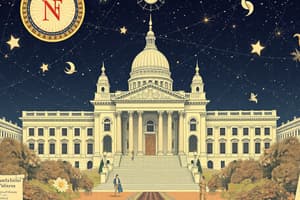Podcast
Questions and Answers
Which of the following statements best reflects the pluralist theory of American politics?
Which of the following statements best reflects the pluralist theory of American politics?
- All political opinions are equally represented.
- Democracy must be led by a single political party.
- Public policies emerge from compromises reached among competing groups. (correct)
- Political power is concentrated among a small elitist group.
Which of the following is generally the most significant influence on an individual's identification with a particular political party?
Which of the following is generally the most significant influence on an individual's identification with a particular political party?
- Education
- Geographic location
- Family (correct)
- Socioeconomic status
Which of the following committee assignments would confer the most power and influence on members of the House of Representatives?
Which of the following committee assignments would confer the most power and influence on members of the House of Representatives?
- Appropriations
- Judiciary
- Ways and Means (correct)
- Foreign Affairs
Which of the following statements about Brown v. Board of Education of Topeka is correct?
Which of the following statements about Brown v. Board of Education of Topeka is correct?
Prior to the Voting Rights Act of 1965, literacy tests were used by some southern states to
Prior to the Voting Rights Act of 1965, literacy tests were used by some southern states to
The practice whereby individual senators can veto federal judicial nominations in their respective states is called
The practice whereby individual senators can veto federal judicial nominations in their respective states is called
Differences between House and Senate versions of a bill are resolved
Differences between House and Senate versions of a bill are resolved
Which of the following principles protects a citizen from imprisonment without trial?
Which of the following principles protects a citizen from imprisonment without trial?
The passage of legislation in Congress often depends on mutual accommodations among members. This suggests that, to some extent, congressional behavior is based on
The passage of legislation in Congress often depends on mutual accommodations among members. This suggests that, to some extent, congressional behavior is based on
Which of the following statements accurately describes the president's veto power?
Which of the following statements accurately describes the president's veto power?
All of the following issues were decided at the Constitutional Convention of 1787 EXCEPT
All of the following issues were decided at the Constitutional Convention of 1787 EXCEPT
The principle of stare decisis refers to which of the following?
The principle of stare decisis refers to which of the following?
The usefulness to the president of having cabinet members as political advisers is undermined by the fact that
The usefulness to the president of having cabinet members as political advisers is undermined by the fact that
All of the following are constitutional rights that neither the federal government nor the states can restrict EXCEPT the right to
All of the following are constitutional rights that neither the federal government nor the states can restrict EXCEPT the right to
In the electoral history of the United States, third parties have been effective vehicles of protest when they
In the electoral history of the United States, third parties have been effective vehicles of protest when they
Which of the following best defines the term 'judicial activism'?
Which of the following best defines the term 'judicial activism'?
High levels of political participation have been found to be positively associated with which of the following?
High levels of political participation have been found to be positively associated with which of the following?
In the past 30 years, the single most important variable in determining the outcome of an election for a member of the House of Representatives has been
In the past 30 years, the single most important variable in determining the outcome of an election for a member of the House of Representatives has been
Which of the following best describes the concept of federalism embodied in the United States government?
Which of the following best describes the concept of federalism embodied in the United States government?
The power of the Rules Committee in the House of Representatives primarily stems from its authority to
The power of the Rules Committee in the House of Representatives primarily stems from its authority to
Which of the following is a function of the White House Office?
Which of the following is a function of the White House Office?
A major difference between political parties and interest groups is that interest groups generally do NOT
A major difference between political parties and interest groups is that interest groups generally do NOT
An election is a realigning or critical election if
An election is a realigning or critical election if
Flashcards are hidden until you start studying
Study Notes
Pluralist Theory
- Public policies arise from compromises among competing groups, reflecting the pluralist theory of American politics.
Political Party Identification
- Family influence generally ranks as the most significant factor in an individual's political party identification.
House of Representatives Power
- The Ways and Means Committee provides the highest level of power and influence to its members in the House of Representatives.
Brown v. Board of Education
- This landmark case declared that segregation by race in public schools is unconstitutional.
Voting Rights Act of 1965
- Prior to this Act, literacy tests were employed by southern states to disenfranchise African American voters.
Senatorial Courtesy
- A practice where individual senators can block federal judicial nominations within their states.
Conference Committee
- A conference committee resolves discrepancies between House and Senate versions of a bill.
Due Process
- This principle safeguards citizens from being imprisoned without trial.
Congressional Behavior
- Legislation passage often relies on mutual accommodations, indicating that congressional behavior operates on the principle of reciprocity.
Presidential Veto Power
- Presidential vetoes can influence Congress; however, only about one-third of bills passed by Congress are vetoed, and overriding a veto is typically challenging for Congress.
Constitutional Convention of 1787
- Significant issues resolved at this convention did not include the voting qualifications of the electorate.
Stare Decisis
- This judicial principle mandates that courts follow precedents established in previous decisions.
Cabinet Members' Loyalties
- Cabinet members may struggle with divided loyalties between their allegiance to the president and their responsibilities to their departments.
Constitutional Rights
- While numerous rights are protected from restriction, the right to be indicted by a grand jury is not uniquely protected for both federal and state jurisdictions.
Third Parties in Elections
- Historically, third parties have effectively protested issues that major parties ignored, influencing public discourse.
Judicial Activism
- Defined as judges' attempts to shape public policy through their decisions.
Political Participation
- High levels of political participation correlate positively with a strong interest in politics, a sense of political efficacy, and a sense of civic duty.
Incumbency
- In recent elections, incumbency has emerged as the most critical factor influencing the outcomes for House of Representatives members.
Federalism
- The U.S. government exemplifies federalism by dividing power between a central government and its constituents while allowing for some shared powers.
Rules Committee in the House
- The Rules Committee has significant authority to regulate debate duration and determine whether amendments to legislation may be considered.
White House Office Function
- The White House Office primarily advises the president on political decisions.
Political Parties vs. Interest Groups
- Unlike political parties, interest groups do not typically seek slots on electoral ballots.
Realigning or Critical Election
- An election is termed realigning or critical when there is a lasting shift in party coalitions.
Studying That Suits You
Use AI to generate personalized quizzes and flashcards to suit your learning preferences.




